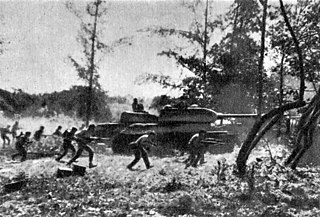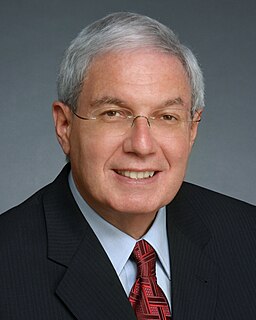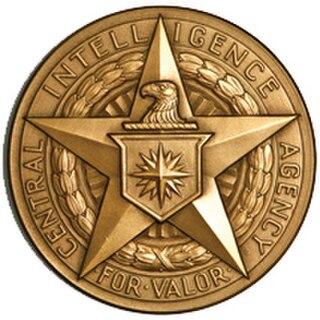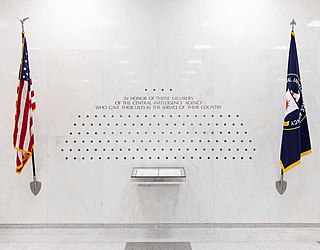
The Bay of Pigs Invasion was a failed landing operation on the southwestern coast of Cuba in 1961 by Cuban exiles who opposed Fidel Castro's Cuban Revolution. Covertly financed and directed by the U.S. government, the operation took place at the height of the Cold War, and its failure led to major shifts in international relations between Cuba, the United States, and the Soviet Union.

George John Tenet is a former Director of Central Intelligence (DCI) for the United States Central Intelligence Agency as well as a Distinguished Professor in the Practice of Diplomacy at Georgetown University.

Robert Upshur Woodward is an American investigative journalist. He started working for The Washington Post as a reporter in 1971 and currently holds the title of associate editor.

The National Commission on Terrorist Attacks Upon the United States, also known as the 9/11 Commission, was set up on November 27, 2002, "to prepare a full and complete account of the circumstances surrounding the September 11 attacks", including preparedness for and the immediate response to the attacks. The commission was also mandated to provide recommendations designed to guard against future attacks.

The Director of Central Intelligence (DCI) was the head of the American Central Intelligence Agency from 1946 to 2005, acting as the principal intelligence advisor to the President of the United States and the United States National Security Council, as well as the coordinator of intelligence activities among and between the various U.S. intelligence agencies.

William Putnam "Bill" Bundy was an American attorney and intelligence expert, an analyst with the CIA. Bundy served as a foreign affairs advisor to both presidents John F. Kennedy and Lyndon B. Johnson. He had key roles in planning the Vietnam War, serving as deputy to Paul Nitze under Kennedy and as Assistant Secretary of State for East Asian and Pacific affairs under Johnson.
This is a list of aviation-related events from 1967:

Ronald Borek Kessler is an American journalist and author of 21 non-fiction books about the White House, U.S. Secret Service, FBI, and CIA.

David Quammen is an American science, nature, and travel writer and the author of fifteen books. For 15 years he wrote a column called "Natural Acts" for Outside magazine. His articles have also appeared in National Geographic, Harper's, Rolling Stone, The New York Times Book Review, The New Yorker, and other periodicals. In 2013, Quammen's book Spillover was shortlisted for the PEN/E. O. Wilson Literary Science Writing Award.

The Intelligence Star is an award given by the Central Intelligence Agency to its officers for "voluntary acts of courage performed under hazardous conditions or for outstanding achievements or services rendered with distinction under conditions of grave risk". The award citation is from the Director of the Central Intelligence Agency and specifically cites actions of "extraordinary heroism". It is the third-highest award given by the Central Intelligence Agency, behind the Distinguished Intelligence Cross and Distinguished Intelligence Medal, and is analogous to the Silver Star, the US military award for extraordinary heroism in combat. Only a few dozen people have received this award, making it one of the rarest valor awards awarded by the US government.

Jose A. Rodriguez Jr. is an American former intelligence officer who served as Director of the National Clandestine Service Central Intelligence Agency (CIA). He was the final CIA deputy director for operations (DDO) before that position was expanded to D/NCS in December 2004. Rodriguez was a central figure in the 2005 CIA interrogation videotapes destruction, leading to The New York Times Editorial Board and Human Rights Watch to call for his prosecution.

The Central Intelligence Agency, known informally as the Agency and the Company, is a civilian foreign intelligence service of the federal government of the United States, officially tasked with gathering, processing, and analyzing national security information from around the world, primarily through the use of human intelligence (HUMINT). As a principal member of the United States Intelligence Community (IC), the CIA reports to the Director of National Intelligence and is primarily focused on providing intelligence for the President and Cabinet of the United States.

Antonya Nelson is an American author and teacher of creative writing who writes primarily short stories.

At the Center of the Storm: My Years at the CIA is a memoir co-written by former Director of the Central Intelligence Agency George Tenet with Bill Harlow, former CIA Director of Public Affairs. The book was released on April 30, 2007 and outlines Tenet's version of 9/11, the War on Terrorism, the 2001 War in Afghanistan, the run-up to the 2003 Iraq war, rough interrogation and other events.

Peter Eleftherios Baker is an American journalist and author. He is the chief White House correspondent for The New York Times and a political analyst for MSNBC. He covers President Joe Biden, the fifth president he has covered after Donald Trump, Barack Obama, George W. Bush and Bill Clinton.

Historical accounts for early U.S. naval history now occur across the spectrum of two and more centuries. This Bibliography lends itself primarily to reliable sources covering early U.S. naval history beginning around the American Revolution period on through the 18th and 19th centuries and includes sources which cover notable naval commanders, Presidents, important ships, major naval engagements and corresponding wars. The bibliography also includes sources that are not committed to the subject of U.S. naval history per se but whose content covers this subject extensively.

Thomas Sergeant Perry (1845–1928) was an American editor, academic, literary critic, literary translator, and literary historian. He was a lifelong friend and associate of Henry James and a member of the faculty at Harvard University.

The United States Central Intelligence Agency (CIA) was created on July 26, when Harry S. Truman signed the National Security Act of 1947 into law. A major impetus that has been cited over the years for the creation of the CIA was the unforeseen attack on Pearl Harbor, but whatever Pearl Harbor's role, in the twilight of World War II it was considered clear in government circles that there was a need for a group to coordinate government intelligence efforts, and the Federal Bureau of Investigation (FBI), the State Department, and the War Department, and even the Post Office were all jockeying for that new power.
Spy: The Inside Story of How the FBI's Robert Hanssen Betrayed America is a 2002 non-fiction book by David Wise. It is about the Robert Hanssen case.
















